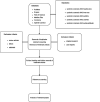Hearing impairment in systemic sclerosis patients-what do we really know?
- PMID: 38562372
- PMCID: PMC10982359
- DOI: 10.3389/fmed.2024.1322170
Hearing impairment in systemic sclerosis patients-what do we really know?
Abstract
Background: Systemic sclerosis (SSc) is a disease of a very heterogeneous clinical picture and immunological profile with progression rate that varies between individuals. Although hearing deterioration is not a complaint that comes to the fore in SSc patients, as it is not life-threatening compared to many other more severe symptoms of this disease, it can significantly impair the quality of life. Medical literature concerning this problem is rather scarce.
Materials and methods: In this article we systematically reviewed the medical publications concerning hearing impairment in patients with systemic sclerosis to evaluate current understanding of this complex problem. Following PRISMA guidelines a total of 19 papers were found and analysed including 11 original studies and 8 case reports.
Results: Although it seems that hearing impairment in SSc patients is relatively more common than in the general population, based on the analysis of available literature, no firm conclusions regarding its frequency and pathomechanism can be drawn yet. Microangiopathy leading to damage to the sensory cells of the inner ear is suspected to be the main mechanism of hearing loss, although damage to the higher levels of the auditory pathway appears to be underestimated due to incomplete audiological diagnosis.
Conclusion: Undoubtedly, the reason for the difficulty in such an evaluation are the complex and still not fully elucidated pathomechanism of SSc, the individually variable dynamics of the disease and the unique heterogeneity of symptoms. Nevertheless, further studies in larger and appropriately selected groups of patients, focused more on the dynamics of microangiopathy and not solely on clinical symptoms could provide answers to many key questions in this regard.
Keywords: auditory neuropathy; capillaroscopy; cochlear diseases; cochlear impairment; hearing loss; systemic sclerosis.
Copyright © 2024 Sieśkiewicz, Rębacz and Sieśkiewicz.
Conflict of interest statement
The authors declare that the research was conducted in the absence of any commercial or financial relationships that could be construed as a potential conflict of interest.
Figures
Similar articles
-
Hearing Loss Secondary to Systemic Sclerosis Vasculopathy: Case Study with a Short Review.Clin Cosmet Investig Dermatol. 2022 May 30;15:967-973. doi: 10.2147/CCID.S356818. eCollection 2022. Clin Cosmet Investig Dermatol. 2022. PMID: 35669089 Free PMC article.
-
The future of Cochrane Neonatal.Early Hum Dev. 2020 Nov;150:105191. doi: 10.1016/j.earlhumdev.2020.105191. Epub 2020 Sep 12. Early Hum Dev. 2020. PMID: 33036834
-
Audiological involvement in patients with systemic sclerosis.Mod Rheumatol. 2022 Oct 15;32(6):1094-1101. doi: 10.1093/mr/roab107. Mod Rheumatol. 2022. PMID: 34850918
-
Main Aspects of Peripheral and Central Hearing System Involvement in Unexplained HIV-Related Hearing Complaints.Front Neurol. 2019 Aug 6;10:845. doi: 10.3389/fneur.2019.00845. eCollection 2019. Front Neurol. 2019. PMID: 31447765 Free PMC article. Review.
-
The impact of permanent early-onset unilateral hearing impairment in children - A systematic review.Int J Pediatr Otorhinolaryngol. 2019 May;120:173-183. doi: 10.1016/j.ijporl.2019.02.029. Epub 2019 Feb 19. Int J Pediatr Otorhinolaryngol. 2019. PMID: 30836274
References
Publication types
LinkOut - more resources
Full Text Sources



